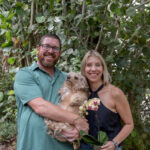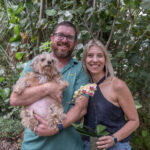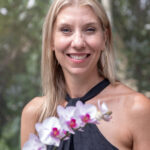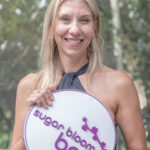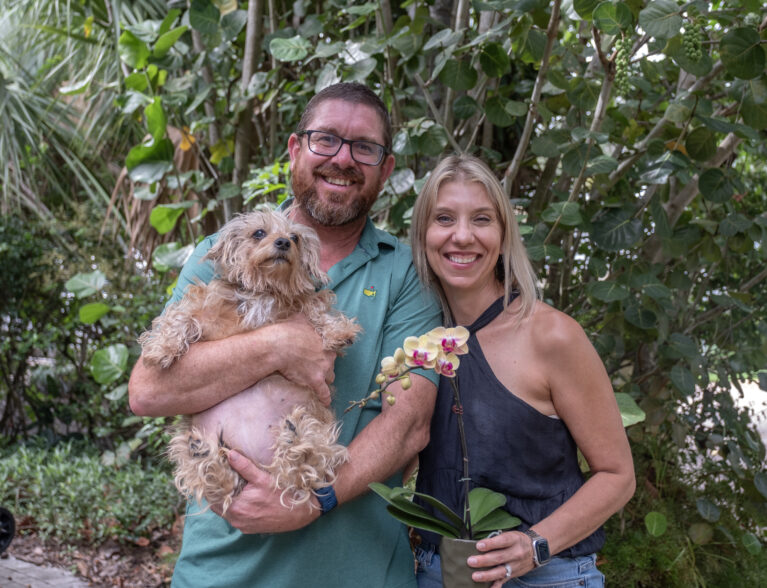
At first glance, orchids and rabies vaccines would appear to be an unlikely pairing.
However, Rachel and Dr. John Clark, owners of the Community Veterinary Clinic in Vero Beach, have found a way to enhance lives and promote wellness through the dual components of their nonprofit Community Health Coalition – the Sugar Bloom Foundation and the Africa Vaccine Initiative.
The couple met when Rachel, raised in Georgia and Virginia, was sent by the company she worked for in New York City to market an upscale safari camp in Zambia. John, who was raised in Malawi and obtained his veterinary degree from St. George’s University in Grenada, was working there as an operations manager. The couple moved to Vero in October 2012.
Sugar Bloom is the most recent of the two initiatives. Rachel Clark initiated it to honor the memory of her mother, known to the family as Sugar, who passed away Jan. 23, 2022, from triple negative breast cancer.
Understanding the anxiety and distress felt by patients undergoing treatments, she hoped to brighten the lives of others battling the disease.
“We started bringing orchids to Florida Cancer Specialists on Feb. 23, 2022, and we’ve done it every month on the 23rd ever since,” says Clark. Shortly afterward, they also began providing monthly orchids to the Scully Welsh Cancer Center at Cleveland Clinic.
What initially began as therapy over her loss has continued to blossom, with friends and family members contributing and through the support of the community at local fundraisers.
In addition to the regular monthly deliveries, they provide about 200 orchids each Jan. 23, Sugar Bloom Day.
And during Breast Cancer Awareness Month each October, every breast cancer patient on the schedules of the two cancer centers gets one. They hope to provide more than 300 orchids to breast cancer survivors this year. Orchids will also be given at the Oct. 9 Get Your Pink On event at the Scully Welsh Center.
“That’s what we’re fundraising for right now; to make sure that we can do that without leaving anybody out,” says Clark.
With the exception of Breast Cancer Month, the orchids are given by staff at the centers to men and women suffering from all forms of cancer.
“A lot of times they give them to a new patient coming in for their first appointment, because they’re so nervous and so scared. Sometimes they give them to somebody who maybe isn’t getting the greatest news, like not a clear scan, and then sometimes they give them to people who just got a clear scan and everybody wants to celebrate,” Clark explains.
Clark says she is often told by patients that just knowing that other people are sending good wishes helps them shift to a more positive mindset.
“Those places are so depressing, and if we can just spark a moment of joy in that really dark space, I think that helps.”
Clark purchases the orchids from Beth Fleming of Evelyn’s Plant Care, who sells them at cost as her father also passed away from cancer.
Along with every orchid, the oncology patients receive hand-written notes from children at Saint Edward’s Lower School, Beachland Elementary, and the pre-school children in the county’s VPK programs.
“It’s called the Junior Blooms program, which is really fun,” says Clark. “Their letters are so sweet.”
During the process of moving their veterinary practice, they removed two large pink doors from the new space.
“We are calling them the Doorway to Kindness,” says Clark. “The doors will be set up at Beachland for the month of September to let the students practice their warm-hearted core values. The kids will sign the doors with inspirational messages.”
On Oct. 4, Sugar Bloom will be the beneficiary of proceeds from pink T-shirts sold at the Vero Beach High School Fighting Indians’ Pink Out Game.
“The Booster Club does a pink T-shirt every year in support of breast cancer awareness, and they encourage the whole stadium to try to wear pink, which is pretty cool,” says Clark. She explains that the beneficiary referral came from the mother of a football player who had received an orchid in the course of her cancer treatments.
“I’m always surprised when people know who we are,” Clark says.
She shouldn’t be; they have already given out close to 1,000 orchids in just over two years.
On Oct. 19, Sugar Bloom will have a booth at the Making Strides Against Breast Cancer Walk at Riverside Park, and will give orchids and notes of encouragement to the survivors. The Doorway to Kindness doors will also be there for people to write inspirational messages.
Additionally, her children and their friends will man water stations along the route for two- and four-legged walkers and will give pink bandanas to all the dogs.
On the subject of dogs, Clark explains that the Africa Vaccine Initiative began as a way for her husband to give back to his country of birth.
“There are more incidents of rabies in Malawi than anywhere else in the world. It has been estimated that one child a day dies in Malawi because of rabies. And these deaths are 100 percent preventable,” she explains.
Estimates vary, but some 60,000 people die worldwide each year; 40 percent of those children. By contrast, because of widespread vaccination programs in the U.S., less than 10 people per year die from rabies, generally from wild animals.
The deadly virus is transferred through the saliva of an infected animal, and once symptoms appear it’s generally fatal. In Africa, 99 percent are transferred through dogs. Even asymptomatic dogs can infect by biting or just licking a person’s scratch or wound.
The Clarks initially donated money from their practice to the Washington State University’s Rabies Free Africa program, which is part of the World Health Organization’s ‘Zero by 30’ initiative (eradication by 2030), before they decided to take a more proactive approach.
Working in conjunction with those organizations, the Malawian government and others, they set up a mini vaccine clinic in 2017.
“The first year we vaccinated something like 550 dogs and one cat. One cat showed up and it was in a little gunnysack. It was so wild they couldn’t open it, so they just injected it through the sack. It was kind of crazy, but we were like, ‘fine, we’ll do a cat.’”
Because they give certificates, she says they would ask owners the dogs’ names, which were often made up on the spot. She recalls one woman rattling off an African phrase that turned out to be: “You will come and do the job, and we will not say thank you.”
“We all started laughing!”
Buoyed by the success of that initial undertaking, and seeing that the need was enormous, they set up their inaugural mass vaccination campaign in 2018, utilizing 16,000 vaccines donated by Merck. Other mass vaccinations followed.
“We would send out people on motorbikes with megaphones to shout out the news of where we’d be,” says Clark.
There are now vaccine clinics in September and March that are administered by a public/private task force. They hope to also establish pop-up clinics for spaying and neutering the ever-increasing animal population.
Although they can’t always be there, she says they do go periodically to make sure everything is administered correctly. They administer 200 free rabies vaccines each year at their clinic in Vero Beach as well.
As with Sugar Bloom, funding for the Africa Vaccine Initiative comes from donations and fundraisers, such as the Veterans Cup Tennis Tournament hosted by the Boulevard Tennis Club.
“What we also encourage people to do is just do something nice for someone. Just take that time,” Clark advises.
“You don’t have to go give an orchid or write a note, but if somebody that you know is struggling, pick up the phone and call them. Just any random act of kindness.”
For more information, visit CHCVero.org.
- PHOTO BY JOSHUA KODIS
- PHOTO BY JOSHUA KODIS
- PHOTO BY JOSHUA KODIS
- PHOTO BY JOSHUA KODIS
- PHOTO BY JOSHUA KODIS
- PHOTO BY JOSHUA KODIS
- PHOTO BY JOSHUA KODIS
- PHOTO BY JOSHUA KODIS
- PHOTO PROVIDED
- PHOTO PROVIDED

